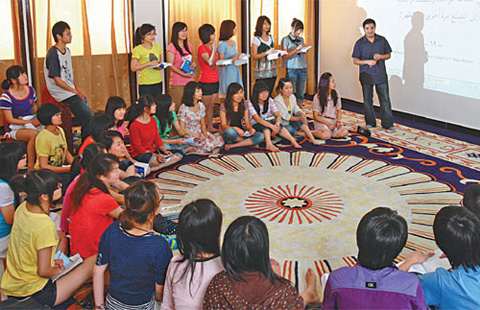China clamps down on high-tech cheating
(Xinhua) Updated: 2012-05-15 22:55SHENYANG - Educational authorities across the nation are embracing newly amended rules to prevent cheating on upcoming college entrance exams.
On Tuesday, local educational and public security authorities in northeast China's Jilin province signed letters of commitment with the provincial government to ensure safety and order for the exams, which will take place from June 7 to 9 this year.
"We are determined to take a 'zero tolerance' approach to exam cheating," said Ma Ming, vice-governor of Jilin.
Public security and educational authorities will join efforts to crack down on illegal activity and ensure fairness for the exams, Ma said.
College entrance exams are treated with great importance in China, as they can determine one's future career and life path.
On Monday, The Ministry of Education issued amended rules concerning punishments for cheating on national exams in response to a growing trend of using technology to cheat on the tests.
The revisions added 15 stipulations to previous anti-cheating regulations to respond to "new circumstances, problems, technology and rampant mass cheating."
The amendments prevent test-takers from taking any kind of equipment that is "capable of sending or receiving signals" into an exam. The previous rule forbade only cell phones and other telecommunication devices.
The difficulty of rooting out technological cheating methods has made the issue a pressing concern for test-takers and educational authorities alike.
"In small counties like ours, examinees have to pass through a metal detector similar to those used in airports," said Nie Shicheng, deputy director of Nanxian county in northwest China's Shaanxi province.
The county has also invested in video monitoring and mobile phone shielding devices to prevent cheating on the exams.
Although the number of cheating violations for China's annual college entrance exams has decreased for five consecutive years, evolving methods of cheating have also made the phenomenon more difficult to prevent.
"It is inevitable that our monitoring efforts will sometimes fail. The trouble should be ended at its source and traced back to education itself," Nie said.
Nie said students should be taught moral and exam-related discipline in order to prevent cheating from occurring in the first place.
Anyone who is caught cheating on a national exam will be barred from taking the exam for one to three years following the violation, according to the amendments created by the Ministry of Education.
An appeal process has been amended for suspected cheaters who rebuke their accusations, the amendments state.
- PLA officers placed under investigation
- Former Nanjing mayor stands trial
- Nuclear power safer than ever
- Domestic vaccine for polio licensed
- Vets battle to save stricken panda in Shaanxi
- Heavy fog disrupts air traffic in Xinjiang
- Article alleges Zhou linked with Bo
- Officials set up pilgrimages for unqualified people
- City halts investment program
- Senior police officer in Guangdong probed






